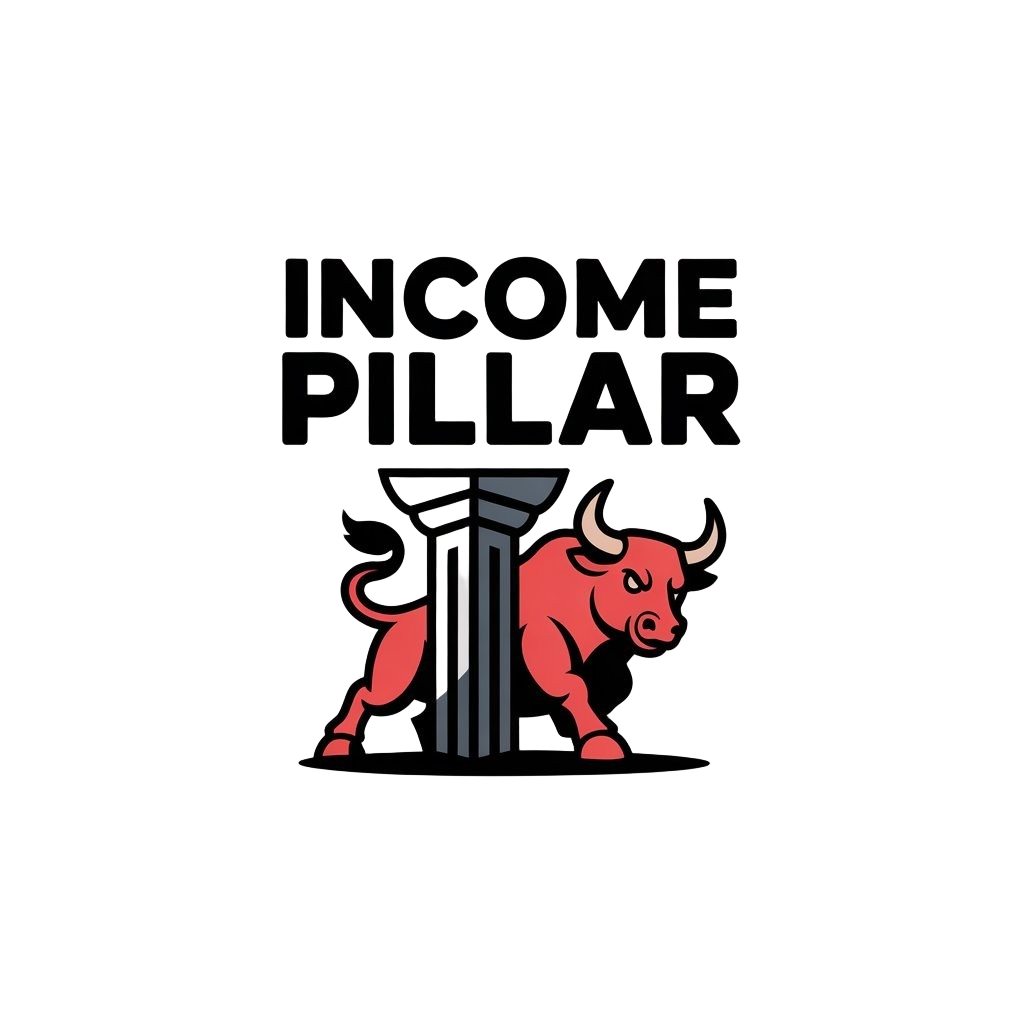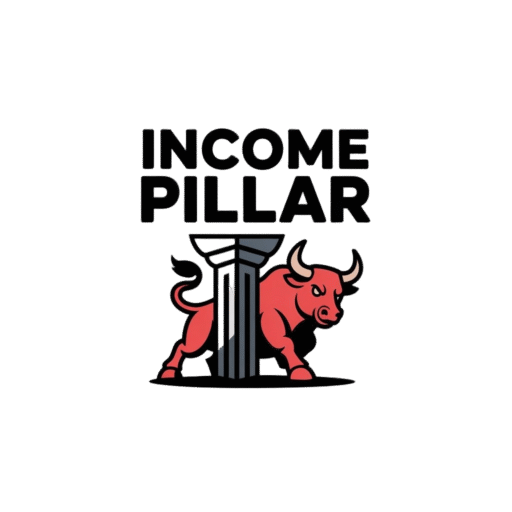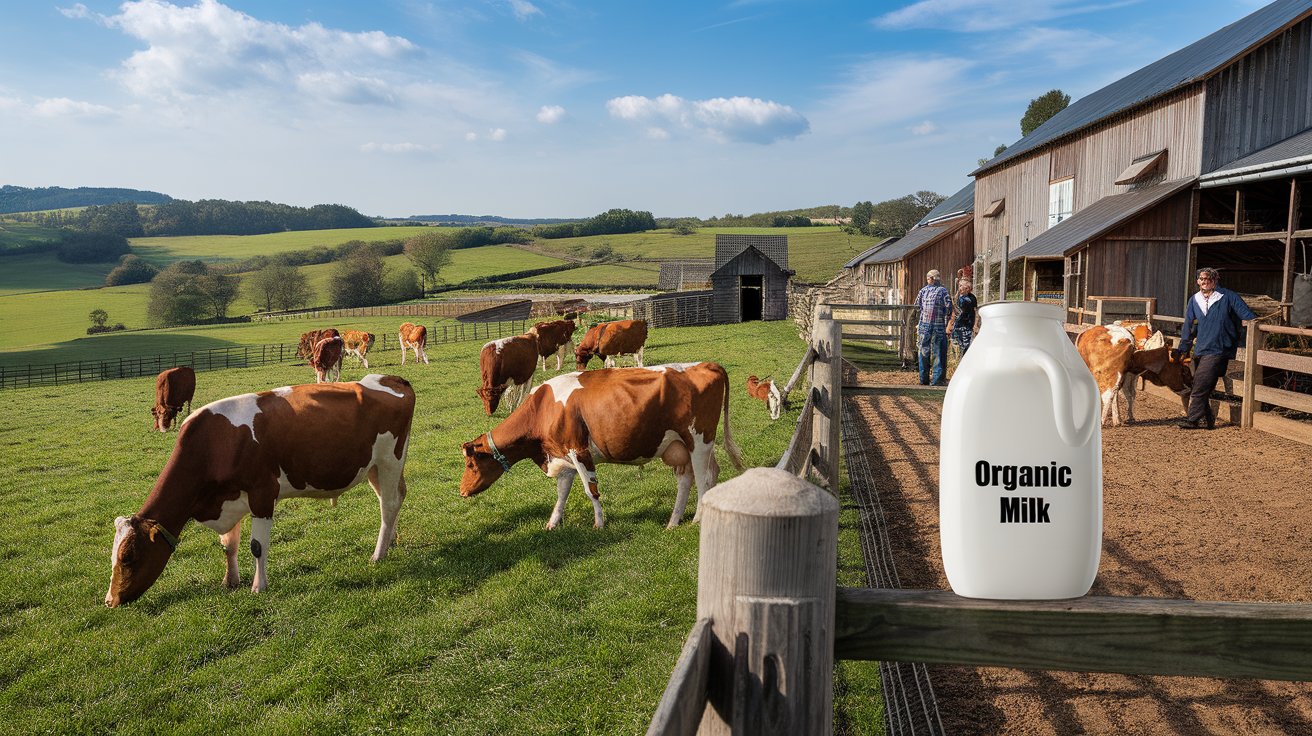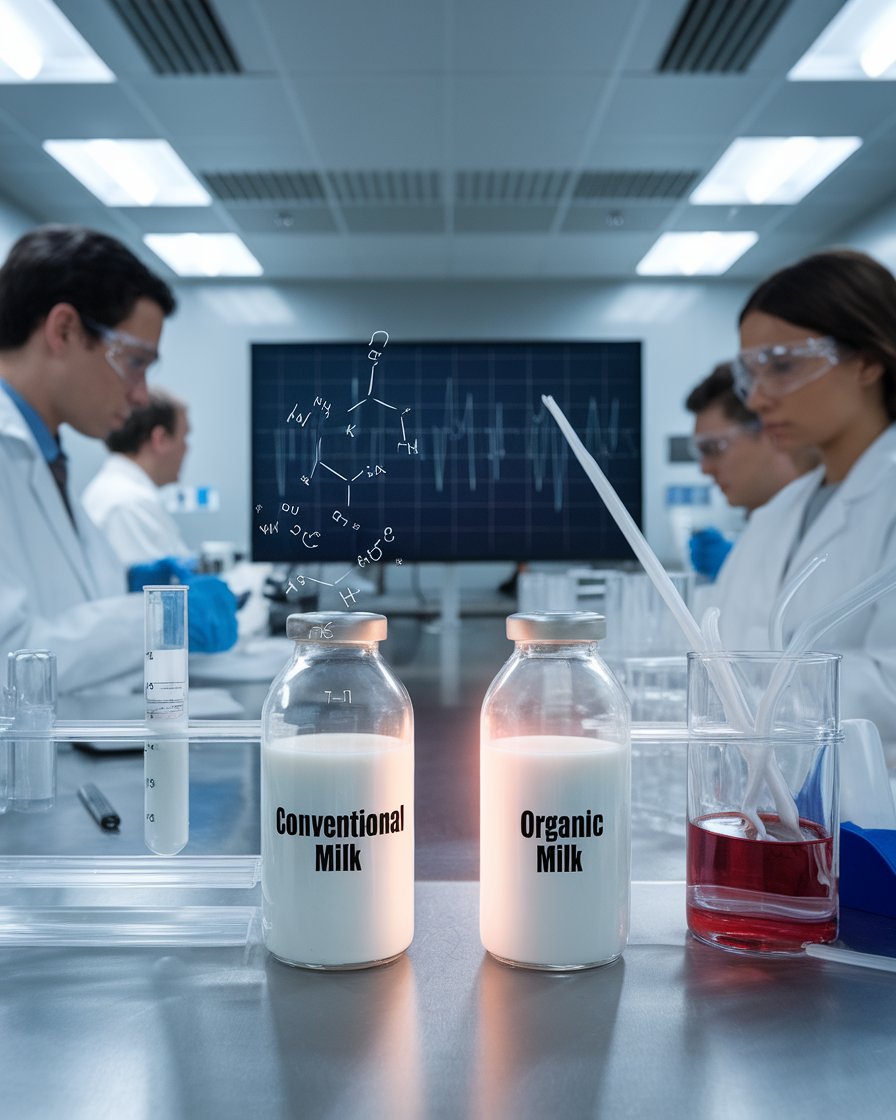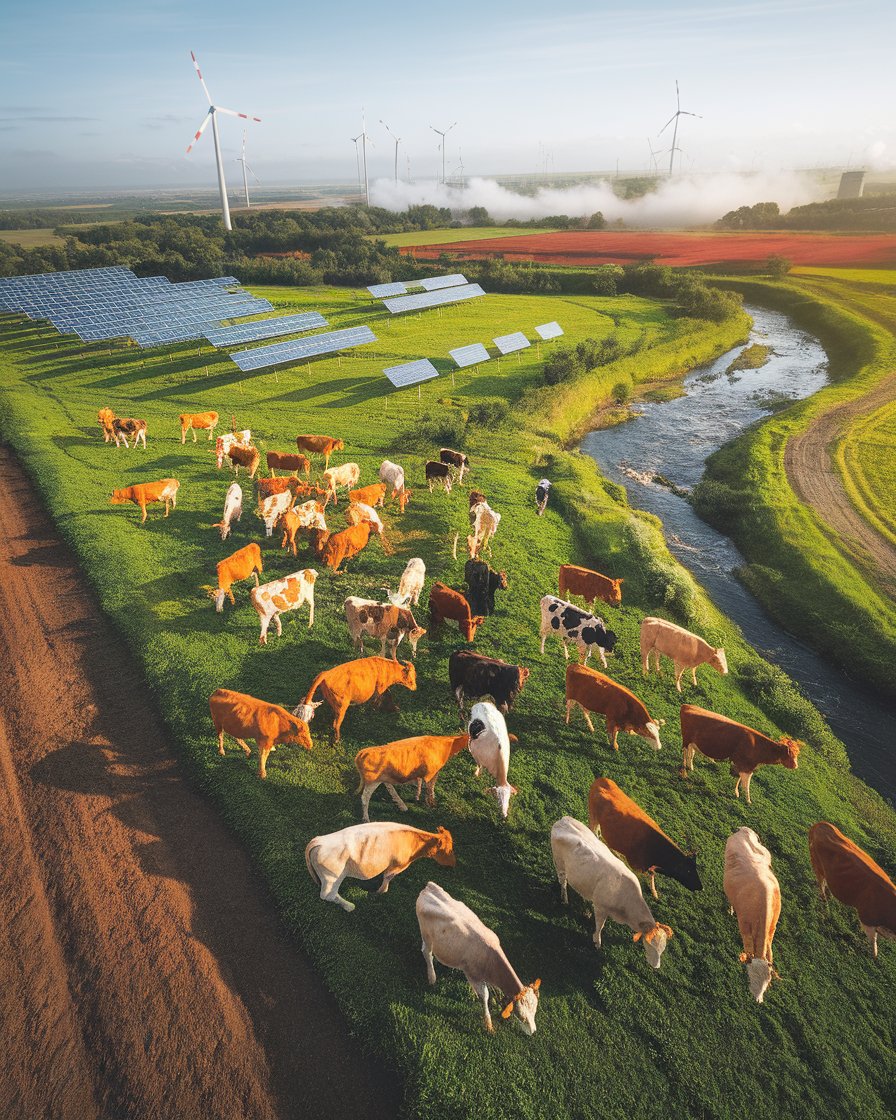Introduction
Choosing the right dairy products for your family is a big deal, especially when you’re weighing regular milk against organic milk and dairy products. Organic dairy is a healthier option because it’s made without any synthetic fertilizers, antibiotics, or harsh chemicals. In fact, studies have shown that organic dairy has more good stuff like essential fatty acids, which are important for staying healthy. Plus, these organic farming practices help cut down on greenhouse gas emissions and are a better choice for the environment.
On top of that, organic cows are treated more kindly—they get to graze freely and live in a way that’s closer to their natural behaviors. Another bonus? Organic milk doesn’t have synthetic growth hormones, which means the milk you’re drinking is cleaner and safer. By going organic, you’re not just picking a better option for your health—you’re also helping out the planet by supporting sustainable agriculture that’s good for soil health and the environment.
Key Takeaways
- Organic dairy provides a healthier option compared to regular milk as it is free from synthetic fertilizers, antibiotics, and harmful chemicals.
- Studies have shown that organic milk contains higher levels of essential fatty acids, which are crucial for overall health.
- Organic farming practices reduce greenhouse gas emissions and contribute to a more environmentally friendly agricultural system.
- Organic cows graze freely and follow their natural behaviors, producing milk without the use of synthetic growth hormones.
- Choosing organic dairy not only supports sustainable agriculture but also promotes better soil health and animal welfare.
- By selecting organic milk, families can enjoy safer, cleaner dairy products that benefit both human health and the environment.
Nutritional Benefits of Organic Dairy
When choosing dairy products, one might wonder about the nutritional advantages of organic options. Not only do organic dairy products taste better, but they also provide significant health benefits that stand out. From essential fatty acids to powerful antioxidants, organic dairy offers a range of nutrients that contribute to better overall health.
Key Benefits of Sustainable Organic Milk and Dairy Products
1. Higher Nutrient Content in Organic Milk
Organic milk contains more omega-3 fatty acids compared to conventional milk. These fatty acids are essential for brain health, heart function, and reducing inflammation in the body. Choosing organic milk helps maintain a healthier balance of nutrients, which can reduce the risk of chronic diseases like cardiovascular issues and asthma.
2. Organic Dairy Reduces Exposure to Harmful Chemicals
Organic dairy products are produced without the use of synthetic pesticides, antibiotics, or growth hormones. This means that by choosing organic, you’re minimizing exposure to harmful chemicals that can negatively affect both human health and the environment. Organic farming promotes cleaner, safer milk free from harmful residues.
3. Rich in Antioxidants and Vital Minerals
Organic dairy is known for being packed with essential nutrients like iron, vitamin E, selenium, and carotenoids. These antioxidants help combat free radicals that can damage cells and contribute to diseases such as cancer and heart disease. By opting for organic dairy, you’re ensuring a diet that provides essential minerals that boost overall health.
4. Sustainable Farming Practices
Organic farming methods are designed to be more environmentally friendly. By using natural fertilizers and allowing cows to graze freely, organic dairy farming reduces greenhouse gas emissions and improves soil quality. These practices not only make organic milk healthier but also contribute to a more sustainable environment.
5. Better for Animal Welfare
Organic dairy farming emphasizes humane treatment of animals. Cows raised on organic farms are given access to open pastures and are not treated with synthetic antibiotics or hormones. This results in healthier cows and better-quality milk, ensuring a more ethical and sustainable farming approach.
Higher Omega-3 Fatty Acids in Organic Milk
Organic milk is renowned for its higher levels of omega-3 fatty acids. Incorporating organic milk into your diet can help restore the crucial balance between omega-3 and omega-6 fatty acids. This balance is essential for reducing the risk of chronic conditions such as cardiovascular disease, asthma, and autoimmune disorders. For families, switching to organic milk means delivering a nutrient-rich option that supports overall health, especially for growing children.
Antioxidants and Nutritional Minerals in Organic Dairy Products
In addition to omega-3s, organic dairy products are packed with antioxidants and vital minerals. Studies have shown that they often contain higher levels of iron, vitamin E, selenium, and carotenoids. These nutrients play a critical role in combating free radicals, which can cause cellular damage and contribute to diseases such as coronary heart disease and certain cancers. By choosing organic dairy, you’re not just opting for a healthier choice but also nourishing your family’s well-being with potent, natural ingredients.
Health Concerns with Conventional Dairy
The benefits of organic dairy stand in stark contrast to some serious health concerns associated with conventional dairy. As consumers become more aware of what they are putting into their bodies, the potential dangers of non-organic milk are increasingly alarming. Conventional dairy products may contain harmful substances that pose risks to human health, making it important to consider organic alternatives.
Case Study: Health Risks of Conventional Dairy and Benefits of Organic Milk
A study in 2019 by The Organic Center found some serious concerns with conventional milk compared to organic milk. Out of 35 samples of conventional milk, 60% had traces of antibiotics like amoxicillin and sulfamethazine, which shouldn’t be used in dairy cows. One of these samples even had more antibiotics than the FDA allows, which is a big red flag.
Even more shocking, conventional milk had 20 times more bovine growth hormone (bGH) than organic milk. This hormone raises levels of IGF-1, which is linked to cancer risks like breast and prostate cancer. On the other hand, organic milk had no such residues, making it a much safer choice for anyone worried about what’s really in their milk. By choosing organic dairy products, you avoid harmful chemicals while supporting better farming practices.
Antibiotic Residues in Non-Organic Milk
One major concern with conventional dairy is the presence of antibiotic residues. Recent studies have revealed that 60% of conventional milk samples tested positive for antibiotic residues, including some antibiotics that are illegal for use in dairy production. This contamination can lead to antibiotic-resistant infections, raising significant health risks for humans. Imagine preparing breakfast for your family, only to discover that the milk you trust may be contributing to the growing problem of antibiotic resistance.
Risks Associated with Synthetic Growth Hormones in Milk
In addition to antibiotic residues, conventional milk often contains synthetic growth hormones like bovine growth hormone (bGH). Levels of bGH in conventional milk can be up to 20 times higher than in organic milk. These hormones can disrupt hormonal balance, potentially impacting growth and development in both children and adults. Understanding these risks empowers consumers to make better choices, highlighting the importance of opting for organic dairy alternatives whenever possible.
Environmental Impact of Organic Dairy Farming
The transition to organic dairy farming not only benefits human health but also plays a crucial role in reducing the environmental impact associated with conventional farming practices. By eliminating harmful chemicals and focusing on sustainability, organic dairy farming creates a more eco-friendly agricultural system. This shift helps protect natural resources, supports biodiversity, and contributes to a healthier planet.
Reducing Controversial Pesticides in Organic Dairy
One of the standout features of organic dairy farming is its strict prohibition of synthetic pesticides. Organic dairy products are cultivated without harmful chemicals, such as chlorpyrifos and permethrin, commonly used in conventional farming. These chemicals are known neurotoxins and can leave dangerous residues in conventional milk. By avoiding these pesticides, organic dairy farming protects ecosystems, allowing beneficial insects and pollinators to thrive. This approach ensures cleaner groundwater, healthier soil, and dairy products that are free from harmful contaminants.
Promoting Holistic Livestock Management Practices
Organic dairy farming also emphasizes humane and sustainable livestock management practices. Farmers focus on animal welfare by providing cows with access to open pastures and fresh air, allowing them to graze naturally. These cows are fed diets free from genetically modified organisms (GMOs) and synthetic additives, contributing to their overall well-being. As a result, healthier cows produce higher-quality milk, benefiting both the animals and the consumers. Organic farming also reduces the need for synthetic antibiotics and hormones, which are commonly used in conventional farming but can have negative effects on both animals and the environment.
“The environment is where we all meet; where we all have a mutual interest; it is the one thing all of us share.” – Lady Bird Johnson
[Source: Various speeches and writings]
Organic Dairy for Children’s Health
Ensuring that children have access to high-quality nutrition is paramount for their growth and development. Organic dairy products, such as milk, yogurt, and cheese, play a significant role in achieving this goal. By providing nutrient-rich options free from harmful chemicals, organic dairy helps support both physical and mental development during these critical years.
Benefits of Organic Milk in Schools
Integrating organic milk into school programs offers numerous benefits. Organic milk is often richer in omega-3 fatty acids and antioxidants, which are essential for developing brains and bodies. Additionally, schools that choose organic options reduce students’ exposure to pesticide residues and synthetic hormones, creating a safer environment for learning. The taste and quality of organic milk are often preferred by students, which can encourage regular consumption and help improve their overall health.
Supporting Federal Organic Food Programs for Children
Advocating for federal organic food programs not only nourishes children but also fosters healthy eating habits from a young age. Increasing funding for organic options in school meals can help make these products more accessible to students. Educating children about the value of organic foods in supporting long-term health is also key. By prioritizing these initiatives, communities can influence children’s dietary choices, leading to healthier future generations.
[lasso rel=”amazon-19″ id=”10170″]
Conclusion
Choosing organic milk instead of regular milk is a smart move for both your health and the planet. Organic milk isn’t made with synthetic pesticides, antibiotics, or harmful chemicals, so it’s better for milk production and improves the soil quality too. Studies have found that organic milk has more healthy fatty acids than conventional milk, which is great for staying healthy.
Plus, organic dairy production really cares about how dairy cows are treated. These cows get to graze naturally, without being given antibiotics or growth hormones. This leads to cleaner, higher-quality dairy, while also helping the environment. By choosing organic, you’re supporting organic farmers who work hard to create better products. When you pick organic, you make a difference, ensuring healthier options in the dairy aisle and a more sustainable future for everyone.
